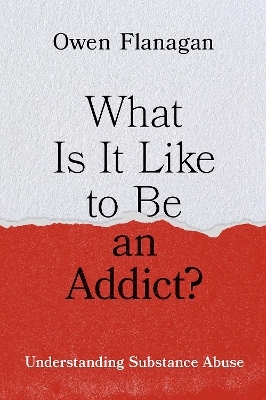
What Is It Like to Be an Addict?
Understanding Substance Abuse
Seiten
2025
Oxford University Press Inc (Verlag)
978-0-19-938892-9 (ISBN)
Oxford University Press Inc (Verlag)
978-0-19-938892-9 (ISBN)
- Lieferbar (Termin unbekannt)
- Portofrei ab CHF 40
- Auch auf Rechnung
- Artikel merken
A powerful and important exploration of how addiction functions on social, psychological and biological levels, integrated with the experience of being an addict, from an acclaimed philosopher and former addict.
What is addiction? Theories about what kind of thing addiction is are sharply divided between those who see it purely as a brain disorder, and those who conceive of it in psychological and social terms. Owen Flanagan, an acclaimed philosopher of mind and ethics, offers a state-of-the-art assessment of addiction science and proposes a new ecumenical model for understanding and explaining substance addiction.
Flanagan has first-hand knowledge of what it is like to be an addict. That experience, along with his wide-ranging knowledge of the philosophy of mind, psychology, neuroscience, and the ethics and politics of addiction, informs this important and novel work. He pairs the sciences that study addiction with a sophisticated view of the consciousness-brain/body relation to make his core argument: that substance addictions comprise a heterogeneous set of "psychobiosocial" behavioral disorders. He explains that substance addictions do not have one set of causes, such as self-medication or social dislocation, and they do not have one neural profile, such as a dysfunction in dopamine system. Some addictions are fun and experimentation gone awry. Flanagan reveals addiction to be a heterogeneous set of disorders, which are picked out by multifarious cultural, social, psychological, and neural features.
Flanagan explores the ways addicts sensibly insist on their own responsibility to undo addiction, as well as ways in which shame for addiction can be leveraged into healing. He insists on the collective shame we all bear for our indifference to many of the psychological and social causes of addiction and explores the implications of this new integrated paradigm for practices of harm reduction and treatment. Flanagan's powerful new book upends longstanding conventional thinking and points the way to new ways of understanding and treating addiction.
What is addiction? Theories about what kind of thing addiction is are sharply divided between those who see it purely as a brain disorder, and those who conceive of it in psychological and social terms. Owen Flanagan, an acclaimed philosopher of mind and ethics, offers a state-of-the-art assessment of addiction science and proposes a new ecumenical model for understanding and explaining substance addiction.
Flanagan has first-hand knowledge of what it is like to be an addict. That experience, along with his wide-ranging knowledge of the philosophy of mind, psychology, neuroscience, and the ethics and politics of addiction, informs this important and novel work. He pairs the sciences that study addiction with a sophisticated view of the consciousness-brain/body relation to make his core argument: that substance addictions comprise a heterogeneous set of "psychobiosocial" behavioral disorders. He explains that substance addictions do not have one set of causes, such as self-medication or social dislocation, and they do not have one neural profile, such as a dysfunction in dopamine system. Some addictions are fun and experimentation gone awry. Flanagan reveals addiction to be a heterogeneous set of disorders, which are picked out by multifarious cultural, social, psychological, and neural features.
Flanagan explores the ways addicts sensibly insist on their own responsibility to undo addiction, as well as ways in which shame for addiction can be leveraged into healing. He insists on the collective shame we all bear for our indifference to many of the psychological and social causes of addiction and explores the implications of this new integrated paradigm for practices of harm reduction and treatment. Flanagan's powerful new book upends longstanding conventional thinking and points the way to new ways of understanding and treating addiction.
Owen Flanagan is an internationally acclaimed philosopher of mind, consciousness, ethics, and comparative philosophy and author of 12 books translated into many languages. He has lectured on every continent except Antarctica, which he has nonetheless visited. Flanagan taught for 16 years at Wellesley College and for 30 years at Duke University.
Note to Reader
Chapter 1 The addict's point of view
Chapter 2 What is it like to be an addict?
Chapter 3 Explaining addiction
Chapter 4 Identity and addiction
Chapter 5 Willing addiction
Chapter 6 The shame of addiction
Chapter 7 The phenomenal authority of Alcoholics Anonymous
Chapter 8 Hope and addiction
References
Acknowledgments
| Erscheinungsdatum | 10.12.2024 |
|---|---|
| Verlagsort | New York |
| Sprache | englisch |
| Maße | 148 x 212 mm |
| Gewicht | 440 g |
| Themenwelt | Geisteswissenschaften ► Philosophie |
| Sozialwissenschaften ► Soziologie | |
| ISBN-10 | 0-19-938892-X / 019938892X |
| ISBN-13 | 978-0-19-938892-9 / 9780199388929 |
| Zustand | Neuware |
| Informationen gemäß Produktsicherheitsverordnung (GPSR) | |
| Haben Sie eine Frage zum Produkt? |
Mehr entdecken
aus dem Bereich
aus dem Bereich
wie Philosophie uns helfen kann, unseren Weg zu finden
Buch | Hardcover (2023)
dtv Verlagsgesellschaft
CHF 39,90


